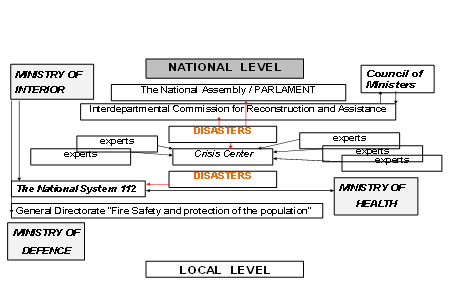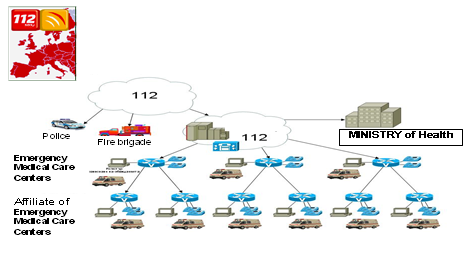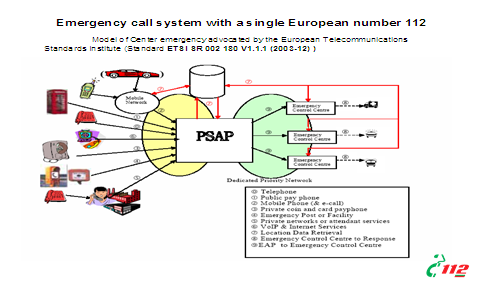The Unified Riscue System (URS) with emergency number 112 in Republic of Bulgaria is a part of the civil protection (CP) system in the country. National system 112 provides continuous assistance to the population in emergency situations, criminal acts, acts of terrorism and disasters. The main and additional components of URS work according to basic principles and organizational structure of CP system in the country. Coordination of activities follows the legislation of protection of the population. Civil Protection legislation is based on the Supreme Law of the country: the Constitution of the Republic of Bulgaria. In Europe and Bulgaria is reported enhancing the danger from man-made disasters. This requires examine in depth the organizational structure and management of URS in Republic of Bulgaria [14, p. 27; 15, p. 200;16, p. 10; 17, p. 20; 18, p. 32 ].
Aim and tasks
The aim of the study is to examine the current organizational structure and management of URS in significant and serious disasters, accidents and catastrophes in Bulgaria.
To achieve the goal we set the following tasks:
- To analyze the legal and normative documents, decrees and procedures in Bulgaria on the organizational structure of the URS in Bulgaria.
- To analyze the legal and normative documents, decrees and procedures in Bulgaria on the management of URS in Bulgaria in case of serious emergency and disaster situations.
Methods. Descriptive analysis of the laws and regulations, in Bulgaria concerning organizational structure and mechanisms for management of the components of URS in Bulgaria for major disasters, accidents and catastrophes.
Results. According to collected data on the organizational structure of the URS it is reported coverage and provided protection for all citizens of the Republic of Bulgaria as well as for temporary foreign residents. According to available information mainly focusing on the population and the forces of URS is in several major cities (Varna, Ruse, Plovdiv, Burgas) including the capital Sofia. In case of disaster has a real opportunity for redirecting the efforts of URS to the stricken region in the country. There is a need for regularly conducting trainings on protection of the population at all levels of protection [7, p. 428; 8, p. 3; 9, p. 5; 10, p. 8; 11, p. 7; 12, p. 6; 13, p. 4 ].
In Bulgaria a common and serious medical situation in the affected regions in the event of different types, sizes and severity Disastrous Situations (DS) are created. The disasters are characterized by the coverage of different sized areas with specific geographical, demographic and economic characteristics. The most typical disasters for the country are floods and forest fires. In case of collapse of the Healthcare facilities during disasters — completely or partially and there is a shortage of health personnel, medical and sanitary property and etc. Arises threat to the health and life of the population and irretrievable and massive medical losses in the affected areas are occurred. The heavy common and medical setting in the DS require in a short time to organize themselves and implement complex of Emergency, Urgent and Emergency-Recovery Measures (EUERM) across the disaster, so as to prevent or reduce the impact of the Damage Factors (DF). Protection of the population from the DF during the peacetime disasters in Bulgaria is achieved through: Implementation of preventive activities, coordination of the actions of a Unified Rescue System (URS) capabilities; Resource ensuring; Informing the public and etc. [14, p. 33].
A National Emergency Plan has been developed, which facilitates the organisation of forecasting, managing and conducting rescue and recovery activities in emergency situations. The plan also defines the obligations for preparedness and participation of all management bodies and other resources in order to provide and receive international emergency assistance. Plans for the protection of the population and material assets are developed by other ministries, state agencies, district governments, municipalities and private companies [14, p. 24; 22, p. 10; 23, p.7; 24, p.18].
Civil Protection legislation is based on the Supreme Law of the country: the Constitution of the Republic of Bulgaria. The Civil Protection system is regulated by the following legislation [21, p. 45, 47]:
- Disaster Protection Act.
- Crisis Management Act.
- 112 Act.
- Local Administration Act.
- Waters Act.
- Defence and Armed Forces Act.
- Ministry of Internal Affairs Act.
- Public Health Act.
- State Administration Acts.
- Other special laws and Related secondary legislation.
The main legislative act is the Disaster Protection Act, adopted in 2006, which established the regulations covering the duty to preserve life and health, and protect the environment and property in the event of a disaster [19, p.28;20, p. 11; 25, p. 7; 26, p. 19].
The Disaster Protection Act stipulates the activities related to the coordination and management of the rescue and emergency recovery efforts among the competent authorities – components of the created Integrated Rescue System − which have to work together in the event of disaster and form units of the unified rescue system.
Organizational structure and management of the work of the rescue system. The System for Protection of the Population (SPP) in Bulgaria includes central and local executive authorities and organizations that manage, conduct and coordinate activities to protect the population and the national economy. The National Assembly (NA) in the country carries out legislative building SPP and national economy in DS. The Council of Ministers (CM) formed State Policy for Disasters, Accidents and Emergencies (DAE) and performs the general management in DS and overcome and mitigate the consequences. Interdepartmental Commission for Reconstruction and Assistance (ICRA) is established by CM in Bulgaria in 2007. This commission organizes, coordinates and manages preventive activities at national level. In case of DS the commission implements the general management of EUERM. Its role is to coordinate the interaction of the various ministries and departments and the implementation of maneuver to the forces and resources of the territorial units. The commission includes heads or deputy heads of ministries and agencies related to the DS. The Commission is assisted by the Crisis Center, which is formed by experts to the relevant ministries and departments. The Ministry of Interior in 2009 include specialized directorates «The National System 112» with Single European Emergency Call Number 112 (SEECN) and Directorate General «Civil Protection» which is transformed and renamed in 2011 to the General Directorate «Fire Safety and Protection of the Population «(FSPP) [14, p. 24]. (Fig. 1)

Fig.1. The rescue system in Bulgaria — organizational structure and levels of management.
To realize the protection of the population in the country was built URS. In addition, with regards to search and rescue activities, the ministry has set up 28 rescue teams under the territorial Civil Protection Directorates, which comprise of 800 rescuers, organised into 145 general rescue teams, 16 alpine groups and 8 diving teams. They provide 24-hour duty shifts. Rescue teams and voluntary formations in the country’s districts maintain permanent contact with the operational communication and information centres of the ministry [1-6, p. 1-10; 21, p. 48]. This system organizes, coordinates and manages the activities of its constituent parts in their preparations, in case of DS and during the conduct of EUERM. Fundamental components of the URS in the country are: DG «CP« at the Ministry of Interior (MoI) and the Emergency Medical Care Centers (EMCC) at the Ministry of Health (MoH). They provide continuous adoption of information, evaluation of the situation and conduct immediate action in case of disasters. Other components of the URS (police and military) provide assistance upon request to conduct EUERM. (Fig. 2). (According to Ministry of Health data)

Fig. 2 Link structure of the 112 in Ministry of Health in Bulgaria (source: Ministry of Health data)
In Bulgaria also is established the National Emergency Call System with the single European emergency call number 112. The system comprises six emergency call centres, one in each planning region. The system is homogeneous, which enables each of the centres to accept calls from any geographical point in Bulgaria, including from geographical areas beyond the respective planning region.
The «National System 112« includes Reception Centers for emergency calls to the URS -112 in Sofia, Varna, Burgas, Kardzhali, Montana and Ruse, and National Emergency Services – DG «FSPP» and Police at the MoI, and EMCC at the MoH. Calls are related assistance and rapid response to DAE, criminal acts, acts of terrorism and the need for emergency care. The general management of the protection of the population in DS is done by the CM, the direct authority of the protection is done by MI and the fixed and operational — by the DG «FSPP». (Fig. 3 and fig 4.). (According to MoH and MoI data)

Fig. 3. National System 112 in Bulgaria (source: MoH and MoI data)

Fig. 4. Emergency call system with a single European number 112 (source: MoH and MoI data)
To improve the performance of the URS in the country has established a National Training Center (NTC) and the Centre for Professional Training of Lifeguards (CPTL) with educational and training base in Montana. A Center for Aerospace Monitoring (CASM) supports the process of monitoring, assessing and managing the risk of natural and anthropogenic disasters. Received and processed data from CASM enabling analyzing and making management decisions in the event of crises, natural disasters, earthquakes, floods, industrial accidents, etc. [14, p. 24].
Conclusion. There is an increasing number of emergency and disasters situation which underlines the importance of efective working of URS. The requirements for the provision of URS in Bulgaria are becoming stricter. The URS in Bulgaria is guaranteed to all those in need of it. The country has a concept for the future development of the system of URS.
References
- Act crisis management project. National Assembly, 2001Health Act, promulgated., SG. 70 of 10.08.2004, effective 1.01.2005, amended. No. 46 of 3.06.2005, am. and supplemented. No. 76 of 20.09.2005, effective 1.01.2007, vol. 9/2004, p 20;
- Act Disaster Protection. State Gazette. 102 of 19 December 2006, amend. Gazette. 39 of 20 May 2011.
- Act disaster Protection. / Prom. SG. 102 of 19.12.2006, amended. and suppl., SG. 81 of 10.20.2015, effective from 01.01.2016,
- Act National Emergency Call System Using Pan European Number 112 promulgated. SG. 102 of 28.11.2008, last. amend. SG. 88 of 09.11.2010
- Annual Plan for 2013 to implement the National Programme for Disaster Protection (2009-1013), Sofia 2012 —
- Annual Plan for 2014 to implement the National Programme for Disaster Protection (2014-1018), Sofia 2013 —
- Chakarova R ,Dimitrova D., First physician aid, Мedicine of the disastrous situations, Arso, S., ’11, 428-432
- Coordinate structures URS in automotive, railway and aviation accidents. Appendix No 72 to section 9 of NPLZB adopted by CMD 973 / 29.12.2010, the Ministry of Interior, the Standard procedure No 07
- Coordination of structures URS for large and complex development on forest fires, Appendix No 70 to section 9 of NPLZB adopted by CMD 973 / 29.12.2010, the Ministry of Interior, the Standard procedure No 04
- Coordinate structures URS earthquake, Appendix No 67 to section 9 of NPLZB adopted by CMD 973 / 29.12.2010, the Ministry of Interior, the Standard procedure No 01
Coordination of structures URS in flood Appendix No 68 to section 9 of NPLZB adopted by CMD 973 / 29.12.2010, the Ministry of Interior, the Standard procedure No 02 - Coordination of structures URS during heavy snowfalls, blizzards and ice. Appendix No 69 to section 9 of NPLZB adopted by CMD 973 / 29.12.2010, the Ministry of Interior, the Standard procedure No 06
- Coordination of structures URS (ESS) in industrial accidents related to the release of dangerous substances, Appendix No 70 to section 9 of NPLZB adopted by CMD 973 / 29.12.2010, MI Standard procedure No 04
- Coordination of structures URS (ESS) on nuclear and radiation accidents, Appendix No 51 to section 9 of NPLZB adopted by CMD 973 / 29.12.2010, MI, SP — No 03
- Dimitrova D., Medical provision of the population during earthquakes — readiness of Emergency medical care center in region Blagoevgrad., MU-Sofia, 2015 — PhD thesis
- Dimitrova D., Hydrofraking — environmental risk and health impacts. In: Ecological ethics, nature and sustainable development, Sofia, 2015, 194-207
- Dimitrova D., V. Slavova, I. Mihailova, Medical provision for the population in disaster situations in Bulgaria – traditions and current tendencies, General Medicine, 2-2015, S, 2015, 9-16
- Dimitrova D.,Evidence based medical practice. Aspects of emergency and disaster medicine. Publisher: Propeller, Sofia, 2015, 7-23
- Dimitrova D., I. Mihailova, E. Georgieva, P. Pecheva, V. Slavova, Organization of mental health services for victims of earthquakes in Bulgaria, Medical management and health policy, 1-2015, S., 2015, 31-46
- Directive 98/10 / EC of the European Parliament and of the Council of 26 February 1998 on the application of open network provision (ONP) to voice telephony and on universal service for telecommunications in a competitive environment, 31998L0010, Official Journal L 101 , 01/04/1998 P. 0024-0047
- European Commission: Critical Analysis if the current practices and methodologies in Risk Assessment including Hazard Identification and Risk Mapping used in a representative sample of Member States, ENV.A.3 / ETU / 2009/007
- International cep handbook 2009, Civil emergency planning in the nato/eapc countries, msb, 43-50 , 45,47
- National Plan for Disaster Protection, MS, S., 2010 —
- National Programme for protection of DAC 2014-2018, MS, S., 2016
- National Programme for protection of DAC 2009-2013, MS, S., 2012
- Risk Assessment and Mapping Guidelines for Disaster Management, Commission Staff Working Paper, SEC (2010) 1626 final, Brussels, 2010
- Slavova V. Ivanov, D. Dimitrova call. European policies to protect the population and humanitarian assistance in emergency situations. General Medicine, issue. 4 2014, S., 2014. 18-22
- Strategy for reducing the risk of disasters from 2014 to 2020 in Bulgaria, Sofia, 2013 — http: //www.saveti government.bg[schema type=»book» name=»UNIFIED RESCUE SYSTEM IN REPUBLIC OF BULGARIA — ORGANIZATIONAL STRUCTURE AND MANAGEMENT» description=»Background. The Unified Riscue System (URS) with emergency number 112 in Republic of Bulgaria is a part of the civil protection (CP) system in the country. National system 112 provides continuous assistance to the population in emergency situations, criminal acts, acts of terrorism and disasters. The main and additional components of URS work according to basic principles and organizational structure of CP system in the country. Coordination of activities follows the legislation of protection of the population. Civil Protection legislation is based on the Supreme Law of the country: the Constitution of the Republic of Bulgaria. In Europe and Bulgaria is reported enhancing the danger from man-made disasters. This requires examine in depth the organizational structure and management of URS in Republic of Bulgaria. Methods. Descriptive analysis of the laws and regulations, in Bulgaria concerning organizational structure and mechanisms for management of the components of URS in Bulgaria for major disasters, accidents and catastrophes. Results. According to collected data on the organizational structure of the URS it is reported coverage and provided protection for all citizens of the Republic of Bulgaria as well as for temporary foreign residents. According to available information mainly focusing on the population and the forces of URS is in several major cities including the capital. In case of disaster has a real opportunity for redirecting the efforts of URS to the stricken region in the country. There is a need for regularly conducting trainings on protection of the population at all levels of protection. Conclusion. There is an increasing number of emergency and disasters situation which underlines the importance of efective working of URS. The requirements for the provision of URS in Bulgaria are becoming stricter. The URS in Bulgaria is guaranteed to all those in need of it. The country has a concept for the future development of the system of URS.» author=»Dimitrova Diana Asenova, Slavova Vanya Bancheva, Platikanova Magdalena Stefanova» publisher=»БАСАРАНОВИЧ ЕКАТЕРИНА» pubdate=»2016-12-23″ edition=»euroasian-science.ru_25-26.03.2016_3(24)» ebook=»yes» ]

